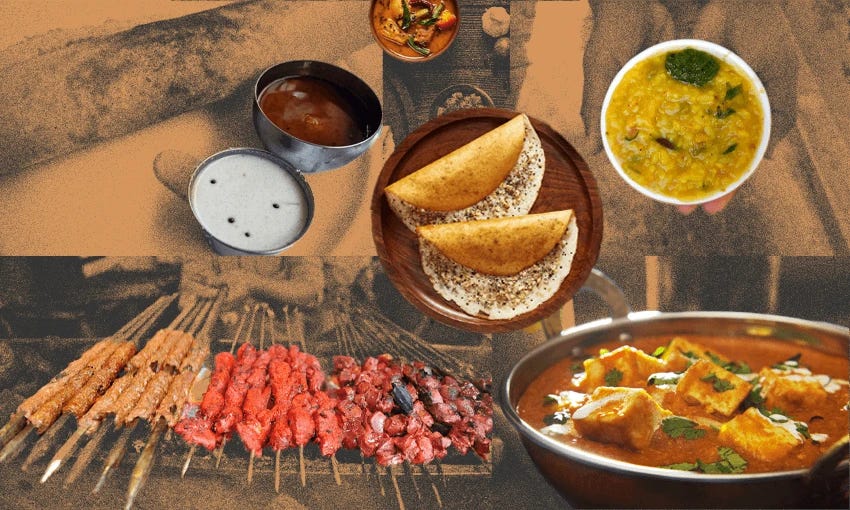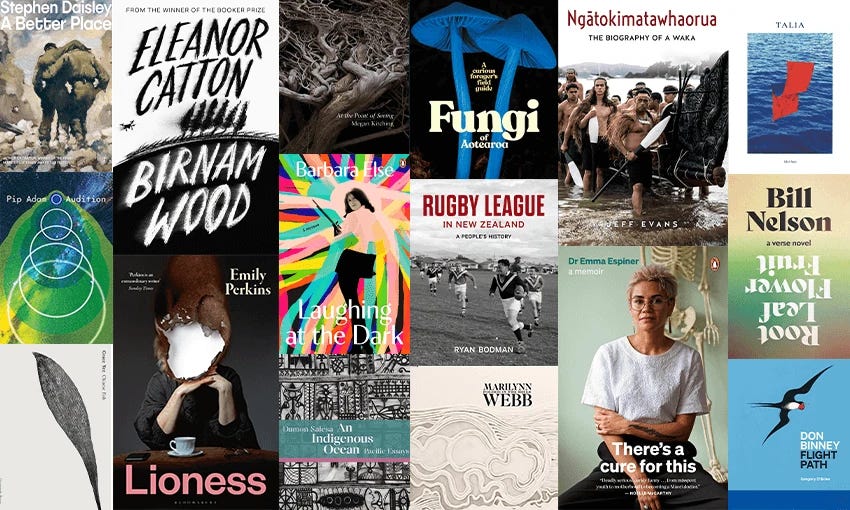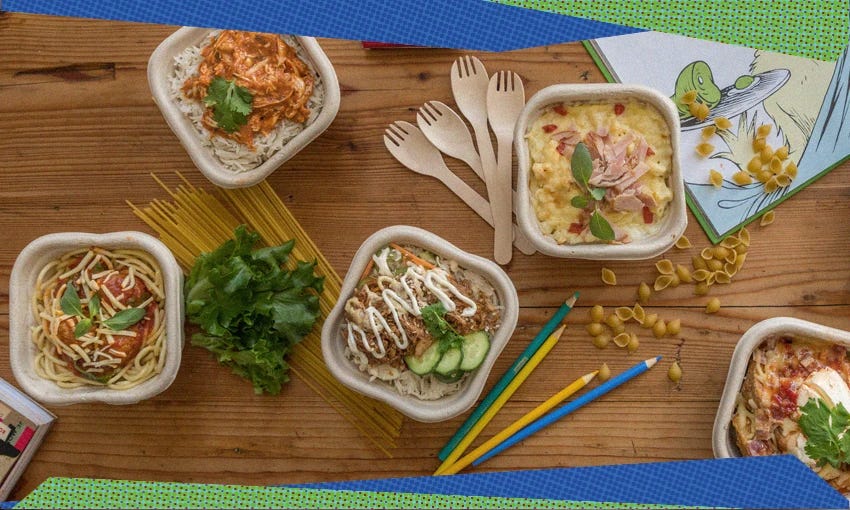There's no such thing as Indian food
But there are heaps and heaps of different regional cuisines
Kia ora and welcome to The Weekend, brought to you this week by a lot of apples. Last week I inflicted several conversations about whether March is that start of autumn on myself by explaining to people that autumn was the reason I was wearing cool socks. Sadly no one noticed the socks because they were distracted by the idea that something as blurry as a season could be delineated by something as definite as a date. But eating lots of (delicious fresh Hawke’s Bay) apples from my colleague Ben has convinced me: it’s definitely autumn! Time to spend all day lying on the floor by the couch crunching on apples and reading.
-Shanti Mathias, staff writer
We don’t need another ‘Indian’ restaurant
Perzen Patel’s friends sometimes refer to her as “the butter chicken police” — they’ve learned how frustrated she gets with the limited Indian food scene in Aotearoa. Perzen has written a piece this morning about those limitations, and how perceptions of Indian food in Aotearoa could be changing. “Writing this helped me realise that change, like good food, takes time: it took the UK decades to get the evolved scene they have now,” she says. “There’s so much depth and diversity within Indian cooking that I could cook a new dish every day for the rest of my life for breakfast, lunch and dinner and still not finish exploring all the dahls, curries, chaats and chutneys, so it blows my mind that most Indian restaurants in Aotearoa serve the same roster of dishes.” As someone who grew up in India, eating everything from flaky kerala parotta to tangy rasam to crispy fried momos to juicy pani puri, I couldn’t agree more — here’s to finding more bitter, tangy karela in restaurants, and so much more!
Financial support from our audience is essential to ensuring our work continues
When there’s a shock resignation, an election or rats take over the supermarkets, we know our community comes to The Spinoff to make sense of the world in the best and worst of times. We're committed to telling stories about Aotearoa, for Aotearoa, with rigour, range and humour. If that’s something you value, we’d love for you to consider becoming a Spinoff member or donating. If you're reading this and are already support us, a huge thank you from all of us.
Mad Chapman, Editor
The books that made the shortlist
The Ockham Book Award shortlist is out this week, winnowing dozens of books of New Zealand fiction and non-fiction into just 16, four each for four categories. Books editor Claire Mabey has a comprehensive examination of each category — her correct and incorrect predictions and who she thinks will win. “My major thing is that the nonfiction category drives me up the wall,” she told me. “I cannot comprehend how the judges compare the memoirs to the scholarly work. I’ve written about it so many times but I just think it should change.” She’s also been intrigued by the fiction list, where one of the shortlisted titles, A Better Place by Stephen Daisley, has flown under the radar. “No one is talking about it, but I’m reading it right now to see what it’s about,” Claire says. The winners will be announced in May – in the meantime, the shortlist makes for an excellent list of recommended reading.
A proposed new housing development that could transform Wellington – and politics
Is Premier House fit to live in or not? Who cares, say Stewart Sowman-Lund and Madeleine Chapman, who have a counter-proposal: if the District Plan passes next week (big if) the government could save heaps of money by demolishing the Thorndon mansion and replacing it with dense, affordable, communal living for MPs. Here’s the proposal: “demolish the current residence and on the large, prime-location plot of land develop a political housing complex. Two neighbouring apartment buildings, one for out-of-town MPs in government and one for out-of-town MPs in opposition. The government apartment building would be just a little bit roomier than the opposition one and the penthouse of each building would be reserved for the prime minister and the leader of the opposition. MPs who fall outside of both government and opposition can choose which building they live in.” Full CBA to come, of course but it’s a unique opportunity to create space for workplace weddings, save taxpayer money and avoid a $30m repair bill.
Help us understand you better. Take The Spinoff survey and dive into a chance to win big – we're giving away three $400 Prezzy Cards.
Your insights matter, and as an independent media company, we value your feedback to enhance your experience. It's quick, anonymous, and your email is only for the prize draw.
Click here to take the survey.
Help me Hera: Should I boycott Eurovision?
The BDS movement has asked people to boycott watching Eurovision as part of the effort to apply cultural pressure to Israel given the atrocities it is committing in Gaza. A reader who has built a tradition of watching Eurovision is feeling reluctant: advice columnist Hera Lindsay Bird responds. “Boycotts alone aren’t enough to secure a ceasefire. But there’s no denying that they’re a powerful form of economic, political and social protest. They were effective in the South African anti-apartheid movement, and they’re effective now. So effective, Israel has repeatedly tried to ban them….Self-abnegation isn’t the point of the exercise here. Try not to think of the boycott as something you’re denying yourself. Boycotts, at their heart, are expressions of solidarity and friendship. Think of the boycott as just this: an expression of solidarity and friendship you’re able to extend to the people of Palestine.”
What are kids getting in school lunches?
The Ka Ora, Ka Ako school lunches programme was launched in 2019 to help make sure students were fed and ready to learn. This week, the National government signalled the programme would be significantly cut. Gabi Lardies cut through the noise and took a look at what kids are actually getting and how much it costs. “Currently 1,023 schools with 229,811 students on their rolls are taking part. Students are not assessed individually because this could cause stigma, discourage families from taking part,” she explains. “There is no menu set by the ministry but it says typical items are wraps, salads, soups and hot lunches. Meals must meet set weight requirements for vegetables, protein, grains and starchy vegetables.”
Alice Snedden picks a fight with farmers in Bad News Saves the World
Everything else
A very poignant, funny story about what we’ll lose as call centre workers are replaced by AI.
Is being a bike courier the ‘best dead-end job in the world’?
Work lunches: al desko, al fresco or not at all?
Loved this recent essay about swimming and climate change in the Pantograph Punch, which announced this week that it’s going on hiatus.
The true cost of the government’s war on coffee.
Gone By Lunchtime discusses a devastating case of entitleditis:
Recipes and meditations on home, memory, and Palestine in this essay about sour milk and bitter herbs.
How to Have Sex is devastating and essential viewing.
Is the future of cities removing concrete and replacing it with nature?
Labelling something a tax is the laziest political trick in the book.
The Newtown Festival is the promise of Wellington.
Everyone wants to know what kind of wearable art this healthcare worker spent $16k on!
An incredible feat of reporting about the threat of solar storms to Earth.
The case for why Wellington should keep character areas.



















